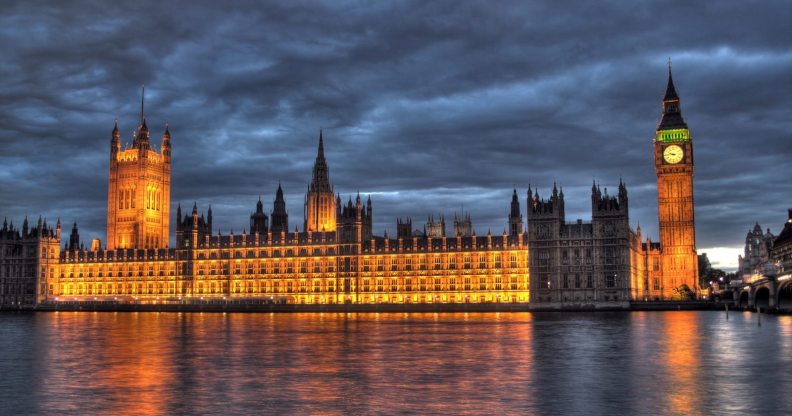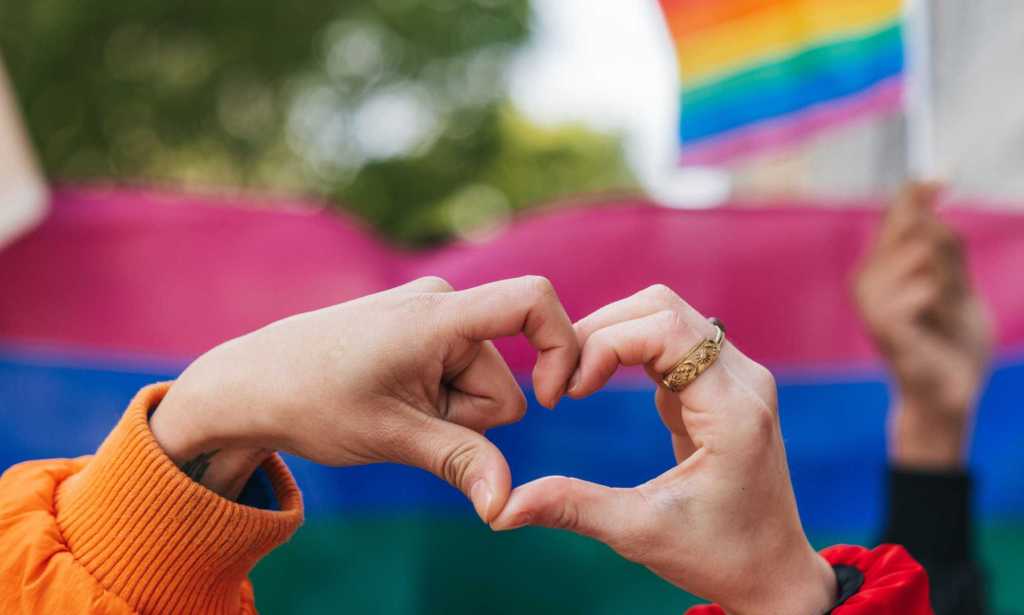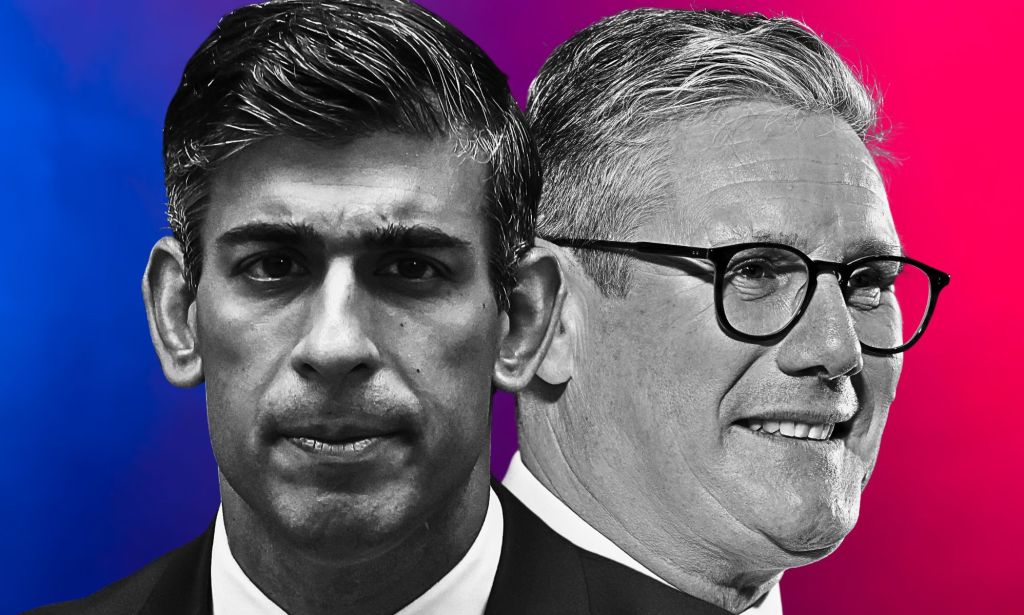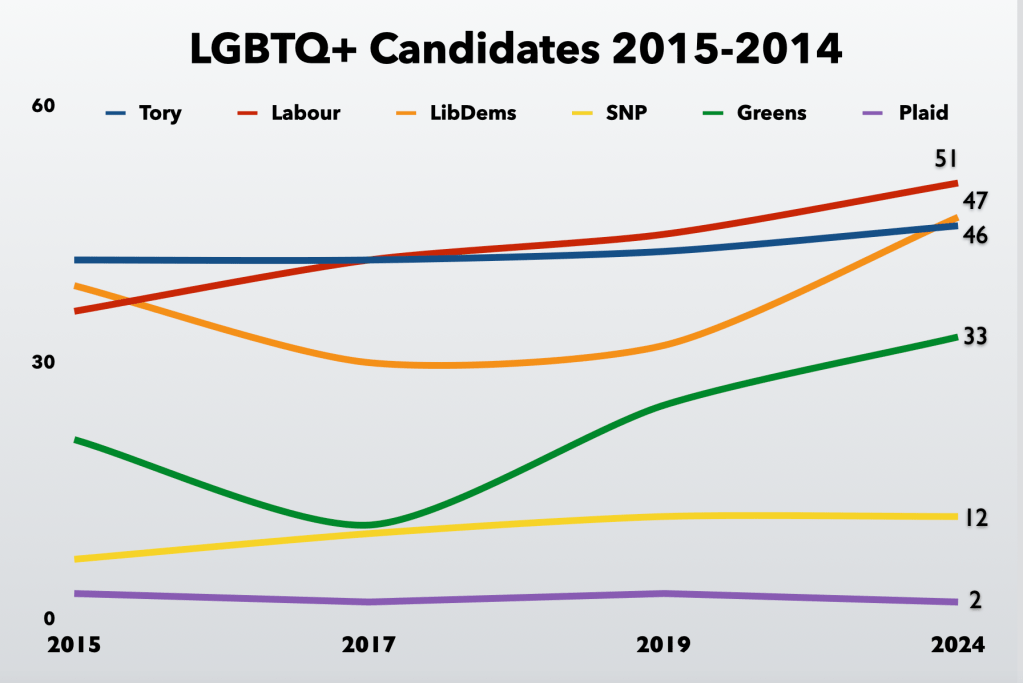Election set to bring seismic change to LGBTQ+ representation in House of Commons

The 2024 general election looks set to change the number of LGBTQ+ MPs in the House of Commons. (Creative Commons)
The UK General Election on Thursday (4 July) looks set to bring a seismic shock to the representation of LGBTQ+ people in the House of Commons.
After decades of incremental gains, unusual parity between Tories and Labour, and a cross-party LGBTQ+ caucus that achieved significant policy advances, the new parliament will look entirely different. The overall number of out LGBTQ+ MPs is likely to decline and the Labour Party will dominate the new intake.
Britain has been a world leader in queer political representation. There were 67 (10.3 per cent of the total) out LGBTQ+ MPs upon the dissolution of parliament in May – by far the largest number of LGBTQ+ MPs anywhere in the world.
27 were elected as Labour MPs, 26 Conservatives, 12 Scottish Nationalists and two Liberal Democrats.
Labour’s cohort increased significantly over the course of the last parliament, while the Tory LGBTQ+ group first increased, then declined. Labour elected 18 out MPs in 2019 but that number was supplemented by four MPs coming out over the parliamentary term and five successful by-election candidates.
In contrast, there were 24 out Tories elected in 2019, five more Tories came out by 2022, but three were hit by scandals resigned: Imran Ahmad Khan in 2022, and Christopher Pincher and Scott Benton, both last year. Furthermore, 13 have chosen to not contest Thursday’s (4 July) general election, and Labour’s, Lloyd Russell-Moyle, was suspended by the party so could not stand.
Neale Hanvey (former SNP, but now standing for Alba) and Rob Roberts (former Tory, now standing as an independent), are given little chance of winning.

Since 2010, there have consistently been more out LGBTQ+ Tory MPs than Labour – an unlikely twist in the history of gay rights in the UK – but there’s about to be a will major shift.
The Tory cohort will be decimated to no more than a handful of MPs – perhaps wiped out completely – while the Labour LGBTQ+ caucus could balloon to more than 40, possibly reaching as many as 49. This would be over four times the size of any other LGBTQ+ party caucus in the world.
David Cameron’s diverse “A List” of candidates in 2010 – promoting women, ethnic minorities and gay men and lesbians – transformed LGBTQ+ representation on the political right, but that legacy is set to be erased. Of the 26 LGBTQ+ MPs, elected as Conservatives at the time of parliament’s dissolution in May, six had become independent MPs over the course of the parliament, seven are not seeking re-election, three moved to seats they believe are more winnable, and the majority of the others are almost certain to be voted out.
The out LGBTQ+ Tories with the strongest hopes of returning to the Commons are Paul Holmes in the new seat of Hamble Valley, and David Mundell (Dumfriesshire, Clydesdale and Tweeddale), although, if the polls are correct, the latter will lose his seat to Labour.
Two Tory MPs who jumped constituencies, Stuart Andrew (Daventry) and Chris Clarkson (Stratford on Avon), do have a chance of winning. Nevertheless, it remains possible that the Tory LGBTQ+ caucus, previously the largest in the world, could all but cease to exist come Friday morning. None of the 29 new Tory candidates are ahead, according to polling.

In contrast, Labour are poised to make gains unheard of in the history of LGBTQ+ representation anywhere in the world. All bar one of 23 looking to be re-elected look fairly certain to win when Britain goes to the polls. The only out Labour MP vulnerable to defeat is Olivia Blake, in Sheffield Hallam, Nick Clegg’s former seat which the Liberal Democrats are targeting. 21 new LGBTQ+ Labour candidates are poised to win based on the latest polling, while another three are in close fights but currently ahead.
Like the Tories, the SNP LGBTQ+ caucus is in deep peril. In 2019, 11 LGBTQ were elected to the Commons. Another, Kirsty Blackman, came out in 2023, while Hanvey defected to Alba in 2021. Of those, only two are predicted to hold their seats: Alyn Smith (Stirling) and Blackman (Aberdeen North). Six are in close races: John Nicholson (Alloa and Grangemouth), Hannah Bardell (Livingston), Joanna Cherry (Edinburgh South West), Stuart McDonald (Cumbernauld and Kirkintolloch), Martin Docherty-Hughes (West Dunbartonshire) and Stewart McDonald (Glasgow South). With Angela Crawley, Mhairi Black and Patrick Grady stepping down, the SNP could have as few as two queer MPs.
With Sarah Dyke’s by-election win in Somerton and Frome in 2023, the Liberal Democrats went from one out MP – Layla Moran in Oxford West and Abingdon – to two. They are both confident of holding on to those two seats – Dyke will be contesting the new constituency of Glastonbury and Somerton – and adding new out MPs Josh Babarinde (Eastbourne) and Olly Glover (Didcot and Wantage). The Green Party Co-Leader, Carla Denyer (Bristol Central), is very likely to be the first out LGBTQ+ Green MP and independent candidate Jason Zadrozny has an outside chance in Ashfield. Zadrozny is the Leader of Ashfield District Council where his Ashfield Independents hold 32 of the 35 council seats. MRP projections don’t do a good job of picking up the support for his local candidacy.
National and seat specific polls suggest a new parliamentary LGBTQ+ cohort of between 43-65 – with a best guest at around 58. A drop from the May 2024 high of 67. The long established parity between Conservatives and Labour will be blown apart. The new caucus will be dominated by the Labour Party with over 80% of the LGBTQ+ MPs. Chris Smith’s legacy will reemerge as the driving narrative.

The last parliamentary LGBTQ+ caucus was made up of 73% men and 27% women. The new caucus is likely to be smaller but the share of women will increase to over one-third. No non-binary candidates are expected to be elected.
When it comes to the number of candidates, party nominations have been relatively stable over the last four elections. This year the main parties have offered 193 LGBTQ+ candidates (alongside two high profile independents) which is the highest number ever in a UK General Election. The Conservatives have nominated between 42 and 46 out LGBTQ+ candidates in each election since 2015. Labour between 36 in 2015 and 51 in 2024, Lib Dems between 30 in 2017 to 47 this year. In 2024 all parties (outside of Remain who did not share their data) have candidate cohorts between 5% and 8% LGBTQ+, the main outlier being the SNP who are at 21%. Labour have done the best job of placing LGBTQ+ candidates in winnable seats (although to be fair there are a lot more targets for Labour this time around).

The number of out transgender and non-binary candidates has actually decreased since 2019 when there were ten. In 2024 the parties have only identified eight trans/GNC candidates. But one of those candidates, Emily Brothers in the Isle of Wight East, has an excellent chance of being the first out trans candidate elected to the House of Commons. The Conservative, Jamie Wallis, came out in 2022, three years after his election, and is standing down this time.
Andrew Reynolds is the author of The Children of Harvey Milk: How LGBTQ Politicians Changed the World (Oxford University Press).
Full list of candidates in named constituencies:
Cowdenbeath and Kirkcaldy
SNP, Lesley Backhouse
Reform UK, Sonia Davidson
Liberal Democrat, Fraser Graham
Conservative, Johnathan Gray
Green, Mags Hall
Alba, Neale Hanvey
Scottish Libertarian Party, Calum Paul
Labour, Melanie Ward
Clwyd East
Liberal Democrat, Alec Dauncey
Conservative, James Davies
Labour, Becky Gittins
Green, Lee Lavery
Plaid Cymru, Paul Penlington
Independent, Rob Roberts
Reform UK, Kirsty Walmsley
Hamble Valley
Liberal Democrat, Prad Bains
Reform UK, Caroline Gladwin
Hampshire Independents, Binka Griffin
Conservative, Paul Holmes
Green, Kate Needham
Labour, Devina Paul
Dumfriesshire, Clydesdale and Tweeddale
Green, Dominic Ashmole
Liberal Democrat, Drummond Begg
Labour, Daniel Coleman
Scottish Family Party, Gareth Kirk
Reform UK, David Kirkwood
Scottish National Party, Kim Marshall
Conservative, David Mundell
Daventry
Conservative, Stuart Andrew
Reform UK, Scott Cameron
Liberal Democrat, Jonathan Harris
Labour, Marianne Kimani
Green, Clare Slater
Stratford on Avon
Labour, Seyi Agboola
Conservative, Chris Clarkson
Reform UK, James Crocker
New Open Non-Political Organised Leadership, Neil O’Neil
Liberal Democrat, Manuela Perteghella
Green, Doug Rouxel
Independent, Kevin Taylor
Sheffield Hallam
Labour, Olivia Blake
Rejoin EU, Sam Chapman
Social Democratic Party, Andrew Cowell
Conservative, Isaac Howarth
Green, Jason Leman
Liberal Democrat, Shaffaq Mohammed
Workers Party of Britain, Mo Moui-Tabrizy
Stirling
Green, Andrew Adam
Conservative, Neil Benny
Labour, Chris Kane
Reform UK, Bill McDonald
Scottish National Party, Alyn Smith
Liberal Democrat, Hamish Taylor
Aberdeen North
Alba, Charlie Abel
Scottish National Party, Kirsty Blackman
Liberal Democrat, Desmond Bouse
Trade Unionist and Socialist Coalition, Lucas Grant
Green, Esme Houston
Reform UK, Kenneth Leggat
Scottish Family Party, Dawn Smith
Conservative, Gillian Tebberen
Labour, Lynn Thomson
Alloa and Grangemouth
Independent, Eva Comrie
Reform UK, Richard Fairley
Workers Party of Britain, Tom Flanagan
Labour, Brian Leishman
Alba, Kenny MacAskill
Liberal Democrat, Adrian May
Scottish National Party, John Nicolson
Conservative, Rachel Nunn
Green, Nariese Whyte
Livingston
Scottish National Party, Hannah Bardell
Conservative, Damian Doran-Timson
Alba, Debbie Ewen
Green, Cameron Glasgow
Liberal Democrat, Caron Lindsay
Reform UK, David McLennan
Labour, Gregor Poynton
Edinburgh South West
Labour, Scott Arthur
Scottish National Party, Joanna Cherry
Reform UK, Ian Harper
Green, Dan Heap
Scottish Family Party, Richard Lucas
Conservative, Sue Webber
Independent, Marc Wilkinson
Liberal Democrat, Bruce Wilson
Cumbernauld, Kilsyth and Kirkintolloch
Conservative, Satbir Gill
Liberal Democrat, Adam Harley
Green, Anne McCrossan
Scottish National Party, Stuart McDonald
Labour, Katrina Murray
Reform UK, Billy Ross
Dunbartonshire West
Green, Paula Baker
Conservative, Maurice Corry
Scottish National Party, Martin Docherty-Hughes
Liberal Democrat, Paul Kennedy
Labour, Douglas McAllister
Scottish Family Party, Andrew Muir
Reform UK, David Smith
Sovereignty, Kelly Wilson
Glasgow South
Green, Niall Christie
Alba, Dhruva Kumar
Conservative, Haroun Malik
Scottish National Party, Stewart McDonald
Labour, Gordon McKee
Liberal Democrat, Peter McLaughlin
Reform UK, Danny Raja
Trade Unionist and Socialist Coalition, Brian Smith
Oxford West and Abingdon
Social Democratic Party, Anni Byard
Green, Chris Goodall
Reform UK, James Gunn
Liberal Democrat, Layla Moran
Independent, Josh Phillips
Conservative, Vinay Raniga
Christian Peoples Alliance, Ian Shelley
Labour, Stephen Webb
Glastonbury and Somerton
Reform UK, Tom Carter
Green, Jon Cousins
Liberal Democrat, Sarah Dyke
Labour, Hal Hooberman
Conservative, Faye Purbrick
Eastbourne
Conservative, Caroline Ansell
Reform UK, Mark Ashdown
Liberal Democrat, Josh Babarinde
UK Independence Party, Ian Garbutt
Green, Mike Munson
Labour, Paul Richards
Didcot and Wantage
Reform UK, Steve Beatty
Green, Sam Casey-Rerhaye
Liberal Democrat, Olly Glover
Conservative, David Johnston
Labour, Mocky Khan
Social Democratic Party, Kyn Pomlett
Bristol Central
Reform UK, Robert Clarke
Liberal Democrat, Nicholas Coombes
Labour, Thangam Debbonaire
Green, Carla Denyer
Party of Women, Kellie-Jay Keen
Conservative, Samuel Williams
Ashfield
Reform UK, Lee Anderson
Green, Alexander Coates
Liberal Democrat, Daniel Holmes
Labour, Rhea Keehn
Conservative, Debbie Soloman
Ashfield Independents, Jason Zadrozny
Isle of Wight East
Labour, Emily Brothers
Independent, David Groocock
Liberal Democrat, Michael Lilley
Green, Vix Lowthion
Reform UK, Sarah Morris
Conservative, Joe Robertson
Data: LGBT Labour, LGBT Conservatives, the Liberal Democrats, Plaid Cymru, Green Party of England and Wales, Green Party of Scotland, the Scottish National Party.
How did this story make you feel?

